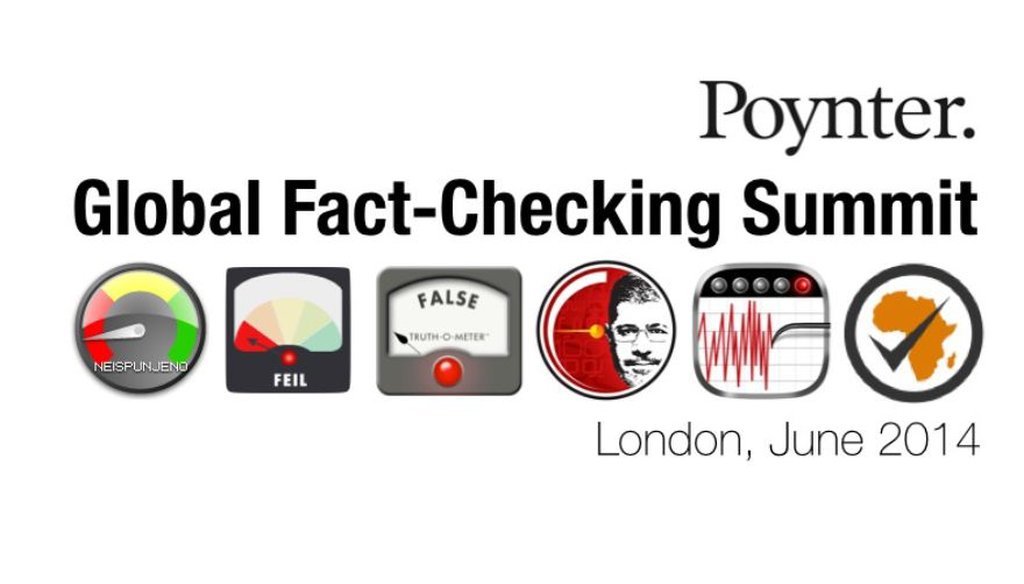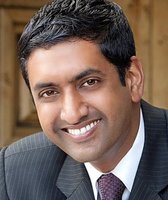Stand up for the facts!
Our only agenda is to publish the truth so you can be an informed participant in democracy.
We need your help.
I would like to contribute

The Poynter Institute hosted the first Global Fact-checking Summit in London.
Last week, journalists and citizens from around the world gathered for a first-of-its-kind conference: the Global Fact-checking Summit. Organized by PolitiFact's first editor, Bill Adair (now a professor of public policy at Duke University), the conference focused on best practices and key challenges for the fact-checking movement.
A conference of fact-checkers might sound straightforward, but we are a group surprising for its diversity.
We include traditional journalists, legal professionals, civic-minded entrepreneurs, energetic students, and nonprofit researchers. We work in countries with strong, longstanding protections for the press, as well as in emerging democracies where much of the media is state controlled. Some of us simply publish and let the work speak for itself, while others seek public corrections from both elected leaders and the media.
All of our situations are different, but I did leave London thinking there’s much that unites us. I had three key takeaways.
1. We're developing methods and processes for fact-checking that all journalists and citizens can use.
Sign up for PolitiFact texts
When fact-checkers get together to talk shop, we talk about evidence, logic and transparency. Is the information we found accurate? Is the source data valid? How was the information gathered, by whom, and when?
Every specific fact-check is different. The fact-checking process itself, though, aims to drill down to the basic building blocks of evidence for whatever is being investigated. At the conference, I presented on how PolitiFact reporters make sure they’re capturing all the relevant information about a given check. Our methods are drawn from both academic and journalistic research: intensive Internet searching; the use of specialized, commercial databases; consultation with experts representing a diversity of views; and a review of library holdings. Online, we list all of our sources and link to original documents.
Thanks to the maturing Internet, fact-checkers can access information and experts quickly. Prior to the Internet, the time needed to collect the information would have meant our reports arrived weeks after the politicians spoke. So the Internet makes our journalism possible, and it also makes it easy to share our work with readers and fact-checkers around the globe. Ideally, after you read a fact-checking report, you understand exactly where the evidence came from and how we arrived at our conclusion.
2. People around the world are adapting fact-checking techniques to their own country's unique information needs, especially in emerging democracies.
Because we can see each other’s work on the Internet, we can take inspiration and lessons from each other about how to do this work. Since PolitiFact’s launch in 2007, fact-checkers have started their own sites in South America (Argentina’s Chequeado), eastern Europe (Serbia’s Istinomer), north Africa (Egypt’s Morsi Meter), just to name a few. The Guardian asks its readers to contribute to fact-checking research at the outset of the report, and Italy’s Pagella politica has created rollicking presentations of fact-checking for TV. I learned a lot from seeing how other fact-checkers do their work in different cultures and political traditions.
I was particularly inspired by the fact-checkers working in countries that don’t have longstanding traditions of a free and open press. In some emerging democracies, media has been either state controlled or state influenced for decades; open propaganda is common.
Fact-checking’s relentless focus on evidence, reason and logic is an antidote to that, and it pulls the public debate back toward what we know and how we know it.
3. The hunger for truth remains a universal human desire, and that's what gives fact-checking its power.
I’ve been fact-checking for seven years now, and in all the fact-checks I’ve done, there’s one response I’ve never gotten from a politician or their staff: "We lied, so what?" Nobody likes a liar, and we all want to be thought truthful. Fact-checking is accountability journalism that holds people accountable for what we say, because words matter.
This is not to say that fact-checking is a panacea: We run into research questions that don’t have clear answers. We argue about whether a specific inaccuracy is minor or downright deceptive. And we all have a hard time accepting facts that directly contradict our self-interest or self-image.
Despite these limitations, fact-checking is still powerful. People want to know the truth. Accurate information is an antidote to corruption, and the ability to speak the truth is a shield against repression. The fact-checkers at the Global Summit on Fact-checking understand this well, and it’s why I believe that fact-checking is here to stay.
Angie Drobnic Holan is the editor of PolitiFact. The Global Fact-Checking Summit was held June 9-10 at the London School of Economics. It was hosted by The Poynter Institute, organized by founding PolitiFact Editor Bill Adair (now a professor at Duke University) and was funded by the Omidyar Network, the National Endowment for Democracy, the Ford Foundation, craigconnects, the Duke Reporters' Lab and Full Fact. Read more about the summit at the Duke Reporters' Lab.
Our Sources
Global Summit on Fact-Checking





















































